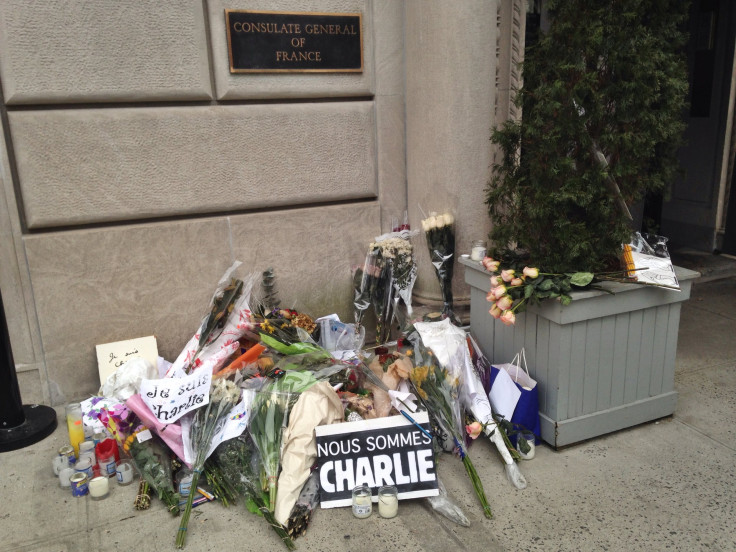Charlie Hebdo NYC: New York City Hunts For New Issue, Expresses Solidarity After Paris Attacks

Philip Tsai wasn't ready to give up after several of his attempts to find Charlie Hebdo came up short. The freelance graphic designer had never purchased the satirical magazine before, but said he was moved to support it after terrorists targeted the publication in Paris last week for printing offensive cartoons of the Prophet Muhammad. Tsai ultimately emerged from the French bookstore Albertine on New York City's Fifth Avenue on Wednesday with instructions for how to order Charlie Hebdo scribbled on a Post-it note.
Across New York City, New Yorkers in the nation's media capital scrambled Wednesday to try to find one of the few elusive prints of the so-called "survivors" issue of Charlie Hebdo, the first printed since two gunmen stormed its Paris office last week, killing 10 staffers and two police officers. For many in the city that has braved multiple terrorist attacks, the Charlie Hebdo issue represented an opportunity to show support for France, free speech and democratic values in the face of Islamist terrorism.
Outside the Consulate General of France, a small memorial honored the victims of the fatal shooting in Paris. People walked by briskly in 20-degree weather, some quickly glancing at the pile of flowers and candles as they passed. A "Je Suis Charlie" sign adorned the memorial, but a consulate worker said they did not have the latest copy of the magazine and were unsure whether they'd get one.
Nearby, potential customers flocked to the Lexington News shop in search of the magazine, but turned up short. A & A Discounts, another store, promised customers it would be available within two weeks.
For many, the French bookstore Albertine was the best hope of finding Charlie Hebdo in New York City, but a clerk turned people away after urging them to check back in a few days. After more curious visitors showed up, store employees taped a sign to the front door: "Sorry, we won't have any Charlie Hebdo issues today."
Jeanne Kendig, a college professor from Boston, was among those searching for Charlie Hebdo at Albertine Wednesday. She said she planned to buy a copy if she could find one. If not, she said she would make a monetary donation to the magazine. "The institution of freedom of the press was attacked," Kendig said, adding that the decisions by some media outlets not to show Charlie Hebdo's Prophet Muhammad cartoons after the shooting were "deplorable" and "cowardly."
John Anderson said he liked Charlie Hebdo's newest cover, which showed the Prophet Muhammad holding a "Je Suis Charlie" sign with the headline "All is Forgiven." "I'm well aware it could be offensive to some," he said, "and there lies the dilemma."
Anderson said he saw no easy solution to the situation in France, but was unsurprised by the passionate response to the attack. He said the principles of liberty, including freedom of the press, live on today.
"France is really, I think, at the center of a worldwide issue, and that's why so many people are touched," said Anderson, an English and history teacher. "Some people say the French Revolution never ended."
But not everyone was a fan. Nicole Jenkins, a solar designer, said she never thought an image could cause such violence. She had mixed feelings about "Je suis Charlie," adding "maybe I've read too many news articles about it." She did not post anything with the hashtag on social media. "You can't really say you are Charlie because you wouldn't speak out the way it does," Jenkins said.
Maximino Acevedo, an electrician, was taking a smoke break by the 42nd Street-Bryant Park station Wednesday. He said he was worried New York might be the next target of a free speech attack -- he was three blocks away from the World Trade Center during the Sept. 11, 2001, attacks. "What they did is wrong," he said of the Charlie Hebdo gunmen. "They went after civilians who were just going to work early in the morning."
© Copyright IBTimes 2025. All rights reserved.






















